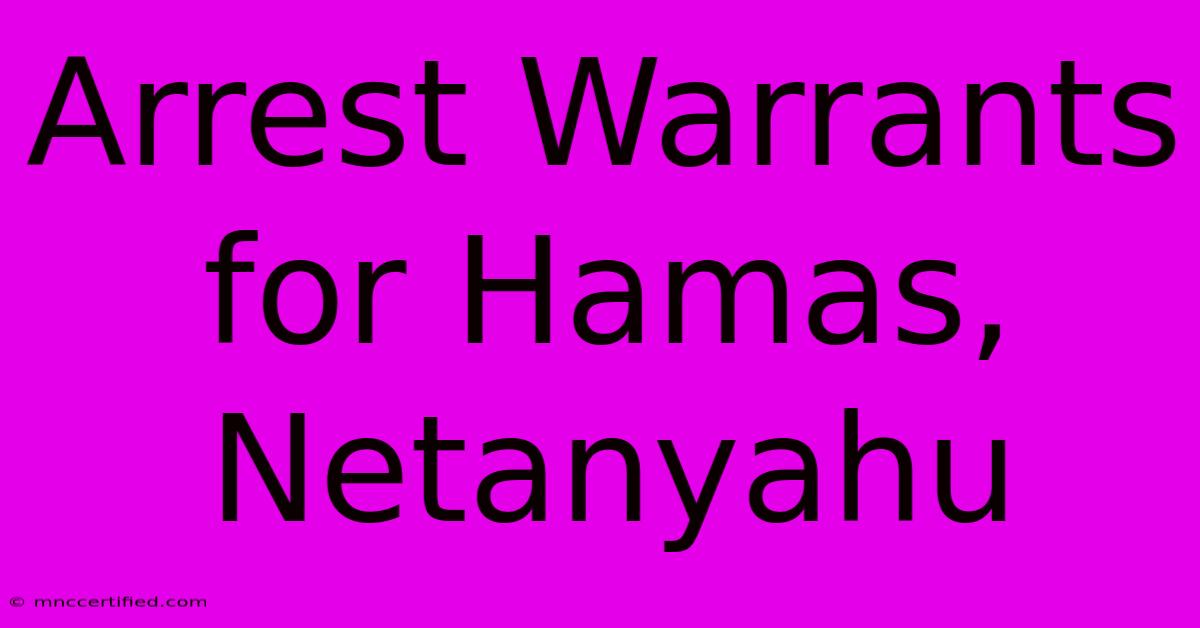Arrest Warrants For Hamas, Netanyahu

Table of Contents
Arrest Warrants for Hamas Members and Benjamin Netanyahu: A Complex Legal Landscape
The recent escalation of violence in Israel and Palestine has brought renewed attention to the legal complexities surrounding potential arrest warrants for members of Hamas and Israeli Prime Minister Benjamin Netanyahu. This situation involves a tangled web of international law, domestic legal systems, and highly charged political realities. Understanding the different legal frameworks involved is crucial to navigating this multifaceted issue.
Arrest Warrants for Hamas Members: International Criminal Court and National Jurisdictions
The International Criminal Court (ICC) has jurisdiction over war crimes, crimes against humanity, and genocide committed within the territory of States Parties to the Rome Statute or by nationals of States Parties. While Palestine is a State Party, the ICC's investigations into alleged crimes committed in the Occupied Palestinian Territories are subject to ongoing debate and challenges from Israel. Any potential arrest warrants for Hamas members would likely stem from ICC investigations into alleged war crimes during the recent conflict, potentially including targeting civilians, the use of human shields, and the destruction of civilian infrastructure.
However, the ICC's authority is limited. Enforcement of arrest warrants relies heavily on the cooperation of member states. Issuing a warrant does not guarantee arrest, as many countries may refuse to extradite suspects, particularly if they hold significant political influence. Additionally, national jurisdictions may also pursue investigations and issue their own warrants based on domestic laws.
Challenges in Prosecuting Hamas Members:
- Jurisdictional Disputes: Establishing clear jurisdiction over crimes committed during cross-border conflicts is extremely difficult.
- Evidence Gathering: Collecting sufficient evidence to meet the high burden of proof in international criminal law can be challenging in conflict zones.
- Political Obstacles: The deeply polarized political landscape makes international cooperation on arrest and prosecution incredibly complex.
Potential Legal Actions Against Benjamin Netanyahu:
While the situation surrounding Hamas warrants is complex, the potential for legal action against Benjamin Netanyahu is even more nuanced. Any potential charges would be within the Israeli legal system, primarily focusing on accusations of corruption and abuse of power that predate the recent conflict. These are separate from the context of the ongoing war, although public perception and international pressure may influence domestic investigations.
Netanyahu's Legal Situation:
Netanyahu has faced multiple corruption investigations throughout his political career. These investigations are subject to Israeli law, and the process, timeline, and outcome remain uncertain. International pressure related to the conflict may indirectly impact these domestic legal proceedings, but there's no direct international legal framework to pursue charges against him for actions taken during his term as Prime Minister, unless the actions violate international law and meet the strict thresholds for international criminal prosecution.
Key Differences between Hamas and Netanyahu Cases:
It’s crucial to highlight the distinct legal contexts:
- Hamas members face potential prosecution for alleged violations of international humanitarian law and criminal law related to the ongoing conflict.
- Benjamin Netanyahu faces domestic legal proceedings concerning corruption allegations unrelated to the current conflict, although public opinion and international pressure might influence the process.
The Role of International Law and the Path Forward:
The events unfolding in Israel and Palestine underscore the limitations and challenges of using international law to achieve justice during armed conflicts. While international criminal justice mechanisms exist, their effectiveness hinges on political will, cooperation from states, and the ability to overcome the complex jurisdictional and evidentiary hurdles. The ongoing situation highlights a need for robust international frameworks to ensure accountability for war crimes, but also recognizes the domestic legal systems' key role in addressing alleged crimes. The future will depend on the political will of involved states and the evolution of international legal mechanisms.
Keywords: Arrest Warrants, Hamas, Benjamin Netanyahu, International Criminal Court (ICC), War Crimes, Crimes Against Humanity, Israeli-Palestinian Conflict, International Law, Domestic Law, Jurisdictional Disputes, Corruption, Abuse of Power, Accountability.

Thank you for visiting our website wich cover about Arrest Warrants For Hamas, Netanyahu. We hope the information provided has been useful to you. Feel free to contact us if you have any questions or need further assistance. See you next time and dont miss to bookmark.
Featured Posts
-
Milhouse Voice Actress Retires From Simpsons
Nov 22, 2024
-
Commercial Insurance Remote Jobs
Nov 22, 2024
-
Piers Morgan Mocks Ellens Decision
Nov 22, 2024
-
2025 Qb Lewis Jackson State Bound
Nov 22, 2024
-
Union Security Life Insurance Co
Nov 22, 2024